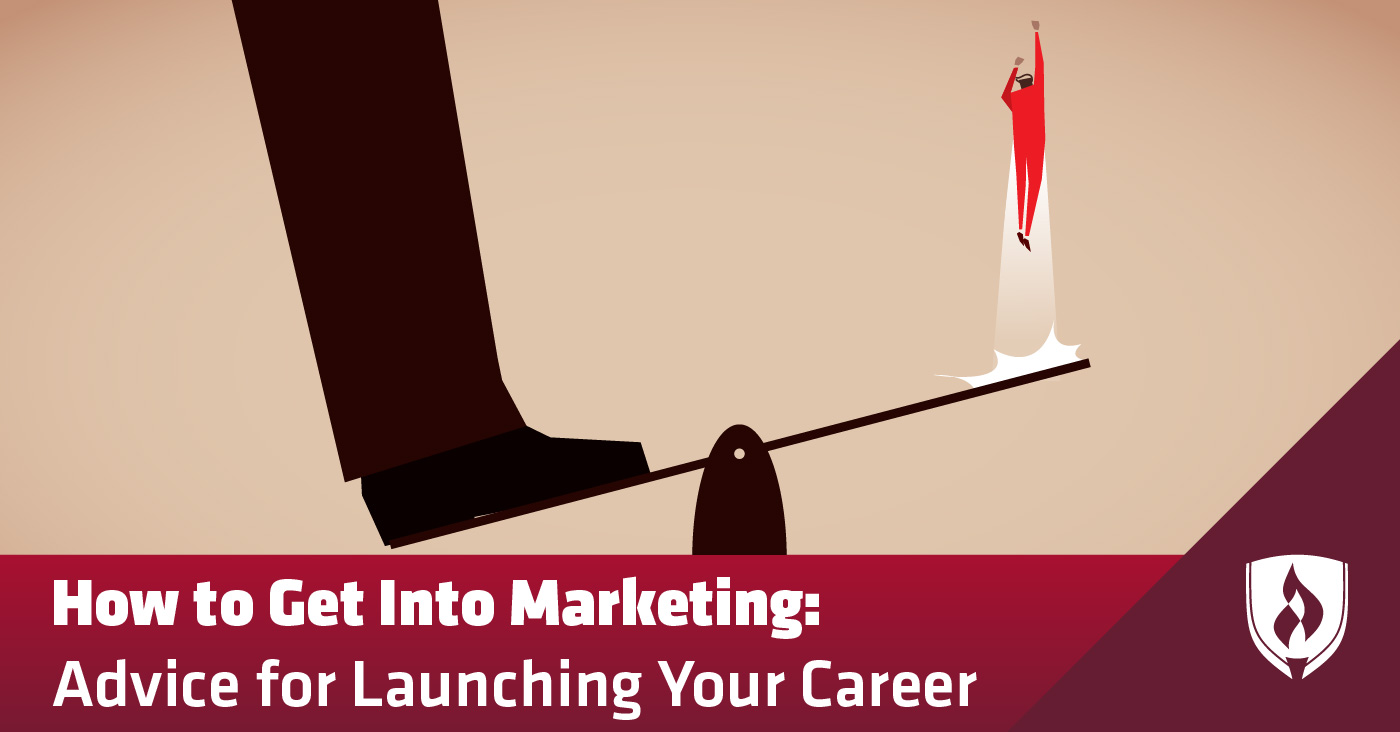
Where do you see yourself in five years? That’s easy. You envision yourself with a successful marketing career, making moves and setting strategies.
But how will you get there? This question is a bit harder to answer. You don’t have a crystal ball to tell you exactly how to get into marketing. You’re confident you can harness your interest in business into the marketing career of your dreams—you just need to know how to get started.
Learning how to get into marketing is within your reach right now! We spoke with marketing professionals who are giving us the behind-the-scenes scoop on how they launched their marketing careers. Read their advice, then follow in their footsteps to embark on your own marketing journey. Want to take a closer look at what marketing entails? Check out our article, "What do Marketers Do?".
Professional advice for getting started in marketing
As with any career, you’ll find there’s not really a one-size-fits-all approach to getting established in a marketing career. That being said, there are several pieces of advice you can mold to your situation to great effect. You’ll definitely want to consider the following.
Start broad, then specialize
The marketing world includes many different specialties, from content marketing and sales to research and analytics. Budding marketers are faced with the decision to choose a specialty or become a jack-of-all-trades. Whether you decide to specialize or be a generalist, our sources say that following your interests will lead you in the right direction.
“You should always focus your career on what you like and what you enjoy doing,” says Mark Miller, marketing director at Jordan Law. “Make sure you’re aware of how to do the basics of all other areas in the marketing field, but find that joy and that focus and become the go-to expert in that field.”
If you’re new to marketing and aren’t sure which area you’d enjoy most, starting with a broad emphasis can help you narrow it down. “I’d focus on being a jack-of-all-trades which lets you try out different aspects of marketing,” says Eric Hoppe, director of marketing at Crowd Content Media Inc. “In most cases I think you'll find an aspect you enjoy best and you can steer your career in that direction.”
Sharpen your skills
Just as your interests can guide your marketing career, your natural skills and talents can help you take your first step into the business world. You might be surprised to learn how the soft skills you already have can set you up for a successful marketing career!
Strong communication ranked high on our marketers’ lists of essential soft skills. “Being able to write well is the most important skill a marketer can have because, in the end, our job is all about communication,” Miller says.
On top of strong writing skills, it’s important to be a good storyteller and empathize with customers, according to Shakun Bansal, head of marketing at Mettl. “As a marketer, you should be in sync with the customer pulse and weave a story around their needs, anticipate their demands and offer intelligent solutions to their challenges.”
What else are employers looking for in their candidates for marketing jobs? We consulted real-time job analysis software to determine the top soft and technical marketing skills employers are seeking.
Top transferable skills for marketers:1
- Communication
- Collaboration
- Creativity
- Attention to detail
- Organization
- Planning
- Writing
- Research
Top technical skills for marketers:1
- Social media
- Product management
- Project management
- Budgeting
- Digital marketing
- Market strategy
- Product development
- Sales
Gain experience wherever you can
Getting real-world experience in the marketing industry can help you hone these skills and build a portfolio of work samples to show prospective employers. Marketing internships and related volunteer or part-time positions are good options for dipping your toes into real-life marketing. During his time as a summer research associate, Bansal says he learned “intangible skills like management, effective communication and leadership”—abilities that improved his overall employability.
Creating your own marketing projects is also an option for showing off your budding skills to potential employers. “I’ve known many students who started blogs, affiliate marketing campaigns, etc. and then built out marketing plans and promoted them,” Hoppe says. “There isn’t a huge investment cost to doing this, and you can get some practical experience that employers will value.”
Even if you don’t land a marketing internship or have trouble finding projects to take on, there are plenty of other life experiences that can prepare you for a marketing career. Miller leveraged his time working as a waiter and bartender to build his marketing skills. “That job allowed me to learn how to talk to strangers comfortably, sell things I would never use myself, and spin a negative situation into a positive one,” Miller says.
Build your network
You’ve probably heard the saying that who you know can be just as important as what you know when you’re on the hunt for a new job. Building a strong network of other business and marketing professionals can give you a leg up in the job search. “Networking is how you get a job,” says Marilyn Heywood Paige, vice president of marketing at Inciting Marketing.
“Start thinking of yourself as a marketing professional right now,” she adds. “Don’t be afraid to introduce yourself to the director of the marketing department or agency you want to work for.”
Paige suggests getting in touch via LinkedIn to ask marketing professionals for an informational interview, then arriving prepared with relevant questions and work samples. Don’t forget to stay in touch after the meeting. “To get a job in marketing you have to show that you can market yourself. This is a strong way to demonstrate that.”
Earn a degree
Acting on all of this advice will certainly help, but you’re not likely to get far without first earning a Marketing degree. Attending college is the natural first step to launching a marketing career, from gaining skills and experience to meeting professionals in the business world.
Having a marketing degree under your belt is also what most employers demand. Our analysis of marketing job postings found that 94% of employers are seeking candidates with a bachelor’s degree or higher.2
No matter which marketing career path you choose to follow, a relevant degree can be the foundation of your future. “Education paves a path for you and instills the necessary attitude and skills to effectively and successfully handle the professional life to come,” Bansal says.
Where will your marketing career take you?
Now that you’ve heard expert advice on how to get into marketing, you’re ready to take the first step toward launching your career. Find out more about where your marketing career can take you with our articles " What Is a Marketing Technologist? A Closer Look at This Emerging Role" and “ 10 Common Entry-Level Marketing Jobs for Recent Grads.”
Related Articles:
- What Is Inbound Marketing? Exploring This Consumer-First Approach
- What Does a Sales Assistant Do? A Closer Look at This Entry-Level Sales Springboard
- A Better Picture of Entry-Level Business Management Jobs
- Inflated Job Titles: Helpful or Hot Air? What HR Pros Should Know
- 11 Essential Business Skills You Mastered Selling Girl Scout Cookies ... and Still Use Today!
1Burning-Glass.com (analysis of 443,924 marketing job postings, May 01, 2018 - Apr. 30, 2019).
2Burning-Glass.com (analysis of 260,290 marketing job postings by education level, May 01, 2018 - Apr. 30, 2019).




